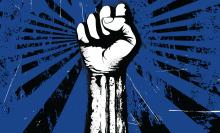“Where do you sit in supporting efforts to speak truth to power?”
Professor Josh Reid brought the 2018 History Lecture Series to a close with a stirring question, and closed out the event which saw respected and award winning faculty from the Department of History take to the stage over four weeks in Kane Hall.
Now in its sixteenth year and sponsored by the Alumni Association, 2018’s theme was Speaking Truth to Power: Protest and Dissent in Modern History.
Topics ranged from Gandhi and the history of his non-violent ideals of protest, to modern day indigenous efforts to stop commercial salmon farming in the Pacific Northwest.
Each week a packed audience listened to faculty offer a snapshot of important protest efforts throughout history.
First to speak was Professor Anand Yang whose talk on Gandhi focused on the history of the revered activist’s life and the germination and impact of his ideals of non-violent protest. Professor Yang painted a colorful and vibrant image and spoke about many of Gandhi's more subtle forms of protest, such as his use of clothing to make pointed political statements against the continued British occupation of India .
The following week Professor Laurie Marhoefer made her debut at the lecture series with a thought provoking talk on popular protest in Nazi Germany. She drew attention to the somewhat surprising success of some efforts, such as the 1943 Rosenstrasse protest, which was led by non-Jewish wives and mothers in reaction to the rounding up of their Jewish children and husbands - presumably for deportation. This successful street protest resulted in the release of those who had been taken. Professor Marhoefer asked, what might the success of this protest, and others, under such an authoritarian regime as Nazi Germany tell us about the potential power of mass demonstrations? Especially in a democracy? And perhaps more poignantly, why, if Germans knew that they could successfully protest the regimes policies, are there not more examples of efforts to do so?
Next, Arbella Bet-Shlimon took audiences on a journey through the history of dissent in the Middle East as a way to better understand and unpack the “Arab Spring.” This talk highlighted the deep roots of middle eastern protest and its links to the region's colonial past, and asked how an event like the Arab Spring - that promised democracy - could lead to the rise of regimes such as Isis?
Professor Reid invoked similar themes during his talk on Native American protests in the era of Standing Rock. He discussed how “sovereignty and and self determination infuse native activism" and reiterated that whilst the optics and tools of activism in the modern era may appear new, contemporary activists are in fact building on decades of native resistance to external powers that would impinge on their historically confirmed rights.
Whilst a diversity of topics were covered many concurrent themes occured over the series. Two things stuck out. 1.) The potential power of mass popular protests and non-violent movements. 2.) The long and protracted struggle of many groups to speak truth to power and how they might be aided in future efforts.
All lectures were recorded live and are available here.
